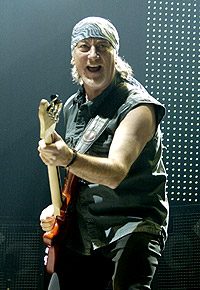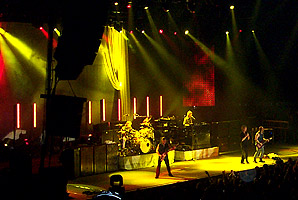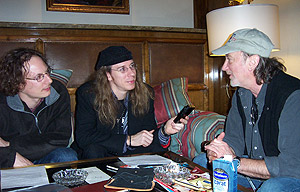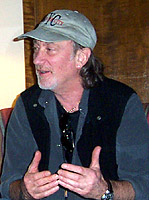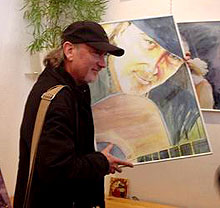

 |
|||
| Home | Interviews | Roger Glover, 16.02.2006, Heidelberg | ||||
| "It's very nice that the new songs go
down so well. I think probably because they were recorded so quickly
and so spontaeously, they translated into stage numbers really quite
well." Interview with Roger Glover, 16.02.2006, Heidelberg |
||||
|
by Andree Schneider & Lars Wehmeyer
Roger Glover (RG): I never expect anything. No expectations, and then there's no disappointments. I had no idea, really. I guess it's a pleasant surprise for all of us. I think in a way it seems obvious looking back because we've done a lot of television. We've done more television this time than I think ever before. Partly because we have a new record company and they want to prove themselves so they've been pushing it. Some fans have come up to me and said "It's not good you're doing this television lip-sync" - yeah, maybe it's not good, but, you know, television is television, it's a law onto itself, really, and it is great promotion, whatever they think about what the band should or should not be doing. It's obviously a good idea. Because, even so, people in the world'll go "Deep Purple - oh yeah, they're still around?" Lars Wehmeyer (LW): That's what people tell me all the time. AS: Who had the brilliant idea of doing a tour together with Alice Cooper? RG: I don't know. No idea. Agents somewhere? AS: Not Bruce Payne? I thought Bruce Payne would have... RG: Well, I'm sure he had a part in it, but I don't know who actually came up with the original idea. AS: After the shows, do you sometimes hang out with Alice Cooper and his band, or is everybody doing their own thing? RG: Pretty much Alice Cooper disappears after his show. There's been a couple of occasions where some of the band have stayed behind. But usually they go. We talked to all the band, we talked to Alice and stuff. And actually, he is called Alice, he changed his name to Alice. Because I asked the band, I said "What do you call him?" They said "Alice!". I think we're planning to get together possibly I think in Munich, we're having a bit of an after-show get-together to celebrate the end of the last date together. AS: The new and unconventional set-list on this tour is a joy for nearly all Deep Purple fans. The great thing is that the new songs are received very well by the audience. I know that you've always considered the previous set lists to be too static. Did you successfully insist on your opinion this time, or how did this courageous set list come into existence? RG: Yeah, it was all my idea. I told the band exactly what to do and they did it. (pause...big grin) Actually, we've been talking about it all last year. Last year was a kind of inbetween-year, and we didn't really have time to rehearse, so we just go out and do shows, it was pretty static. But we all felt that we needed to inject new songs, that's why you do albums really, to get new songs. We knew it was going to happen. But it's very nice that they go down so well. I think probably because they were recorded so quickly and so spontaeously, they translated into stage numbers really quite well. LW: "Before Time Began" was, in my opinion, the strongest song from the new album during the show - it gave me goose bumps and I was reminded of 1996, when I heard "Sometimes I feel like screaming" live for the very first time, it was a similar "Magic Moment". Do the songs sometimes have a similar effect on you when you're on stage? Do you experience "Magic Moments" during your shows? RG: Yeah, I suppose yeah. I thought "Before Time Began" would be a good stage number, and I wrote an email to the band about two weeks before the tour. We started talking about what songs, and so on. And I said, I thought, "Before Time Began", we should definitely really try that. We tried most of the songs, some of them didn't work, as well as we'd like to, but "Before Time Began" just clicked. But not everyone likes it. I've seen reviews where people say they don't like it. You can't please everyone. Actually, we don't set out to please anyone, really, except ourselved. AS: I think it's a great idea to have some visual highlights in your stage setup. The last time this was true was during the "The Battle Rages On" tour. The "Rapture"-stage setup, with the huge light show and the projection screens is very modern - who had the idea for this setup?
AS: Are there any plans to produce a live-CD or -DVD following this tour? RG: No plans at the moment, but I think it would probably be a good idea. LW: you could probably some of the footage from the projection screen as basis for a DVD AS: Do you record it every evening? RG: No. Not to my knowledge. I guess someone's recording it somewhere, but we're not officially recording that stuff, no. People in the audience have their own DVDs, I'm sure they're recording with cameras and stuff. LW: Beside your work on stage, you also work very hard to have a good and close relationship with the fans - which you can see since you're sitting here with us. Where do you get the motivation after an exhausting show to talk to people, give autographs, have pictures taken, or to even do an interview at such a late hour?
AS: For example? RG: Vincent Price. I was told about Vincent Price the other day, what a lovely guy he was. And Twiggy, the whole Butterfly Ball thing, was lovely people, very professional, very together. I think I've told you this story before about Bruce Welch, have I? AS: No. RG: When I was fifteen, in school, and we had our first band, and we were just learning, we had about two-and-a-half chords down at that point, and it was all very basic djingy-djingy stuff, and "The Shadows" were a huge band in England - Cliff Richard's backing band. They had a hit in their own right, "Apache" was their first hit. When that came out, that changed my life, as it changed nearly evey boy's life at that point, and probably girl's too, I don't know. We found out that Bruce Welch who was the rhythm guitarist of "The Shadows" lived a couple of miles from our school. And so three of us trecked there one day after school, I don't know where we got the address from, but all of a sudden, there we are looking at this house. It was not really that special house, it was a semi-detached house, quiet street, and quite nice by our standards. We were sort of looking: "He has walked through that door! He, Bruce Welch has actually walked through that door! There, his windows, he's opened those windows", you know, it was just a magic thing looking at this house. And within a few minutes, a car pulled up, and Bruce Welch stepped out. And we all sort of hid behind the wall, he saw us, and he said "Hey, kids, what are you doing?" - "Nothing, Sir, nothing" - "Come here! What are you looking at?" - "Oh, we're fans and all", and he invited us into his house, and we went in and sat there in his living room for about one hour or so, and he played some music, he played his latest favorite hits of the day, gave us a drink of water and an apple each, and after an hour he said "Right, it's time to go" - he was just absolutely the gentleman and it left a very very deep impression on me, that someone that big could just be so ordinary and kind. That was a good lesson to learn. The ironic thing is that not that many years later, probably nine, ten years later, I found myself in the same position of being in a huge band and kids coming up to me with tears in their eyes and shaking because I was the most famous thing they'd ever seen. I was totally humbled by that because I didn't feel that I deserve that kind of attention. But then I thought about Bruce Welch, and I thought "He was such a nice guy to me, let's carry it on". AS: Wenn you have a day off during the tour - do you enjoy it or do you feel bored, especially in the evening? RG: Hmmm - no, I enjoy it. I try to enjoy everything, there's no point in not enjoying something. This is a pretty grueling tour, it's been actually really a lot of heavy work, a lot of travelling, so a day off really is kind of necessary. Frequently, I found myself doing absolutely nothing, just going out for a walk, having a nice meal - and I'm generally enjoying it, yeah. AS: All of you are still very fit, and I have great respect for your achievements on stage. Beside the fun that you're obviously having, it is also a very hard job. It has just been announced that you will be on tour for another two years, that's a very long time. Don't you ever get fed up with that? RG: No. AS: That's good for us! (laughter) RG: You do bring up a good point. It's a lot harder work than people think. People think it's a life of glamour, excitement and parties and fun, it's not like a real job. But it is a hard job. It's a hard job to keep focused, it's a hard job to keep yourself in shape. We don't really try to keep in shape, I guess the fact that we go on stage for a couple of hours every night really kind of helps. I was about to say something, but I can't remember what it was - forget it. Andree turns the tape
LW: Is there a particular reason for the oriental touch and sound of the title song "Rapture Of The Deep" (beside the fact that it just sounds great, of course)? This oriental inspiration was also present in other, older songs - is there any particular place where you take that inspiration from? RG: I don't even think of it as oriental, I suppose you could say it's oriental in nature, but to me it's just music. Don came up with that riff, and its working title was "Turkish Delight". And when he first started playing it, Paicey started playing a beat to it. When we got to the recording session, Paicey and Don had been jamming around, and we actually didn't look at it for a couple of weeks. I remember Paicey saying "Don's got this pretty weird idea, we should have a look at it sometime". So two weeks later we did have a look at it and spent a very interesting afternoon working out the arrangement. But it's not a choice to go oriental. We don't make those sort of choices, we don't think that much, actually, we don't premeditate anything, we don't start an album by having a meeting saying "Right, what direction are we going to take?". It's really an adventure for us, as well as it is for the people listening to it. We have no idea what it's going to be like when we start. LW: I read in an interview that you were pretty upset that "Things I never said" didn't make it onto the album. Who took this decision and why was it taken? RG: The thing that upsets me is not that it was "Things I never said", but it was the fact that one was left off the album in the first place. To me, when you do an album of twelve songs, there are twelve songs to be on the album. It's really a business thing that is based largely on the japanese market where they charge so much for CDs they always want something extra for it. It's very difficult once you've finished the album and someone says "Well, you gotta pick two to leave off". It's really a horrible situation, and no one could really decide. I don't know actually who decided which was the one to leave off. I wouldn't have left any off, but then again I'm not a business man, but it's not something I like. To me, if there's going to be an extra it should be just a live track or an out-take or a jam, but then of course you can't win because all the completists out there will want everything you do anyway, so no matter what you do, you're going to piss someone off. I just didn't like the idea when we finished the album suddenly we had to cut some of it. It wasn't "Things I Never Said" - "Things I Never Said" actually I think is a better song than maybe one or two of the others that were on the album, but that's in hindsight. It's worked out to be a great live song, but, you know, there's the tour edition coming out now which includes all the songs plus all the extras, so it's kind of, ah, I don't know, it's business stuff. I hate that. That's why I was upset really. It's the nature of the business. AS: You will get a golden record with the tour edition. RG: Maybe - I've heard rumours. AS: I have a close contact to record company... RG: I know - you seem to get more of the stuff than I do. You heard the album before I heard it. AS: Yes - I think that's ok. (laughter) Talking about the album, I really like the album. Are you happy with the sound or the production of "Rapture Of The Deep"? RG: (Hesitation) AS: Have a beer! (laughter) RG: I think Michael Bradford is a really fine musician, a great writer, a lovely bloke, and I think he's generally done the band good service. However, (pause) and I have to also say that every production that I've done I'm also unhappy with, so, I'm no more happy with this album than I am with any album that I've been involved with, really. It's just a question of the mix, I think. I would have mixed it differently. I would have done different things. But then, you know, I have to relinquish my role as a producer. I have to say "Ok, he's the boss". And that's difficult. I had to actually staple my lips together because I didn't want to say too much. To be a producer, you have to have the trust of the band. And as much as I may not like some of the mixes, I have to live with them. That's the way it is. AS: It must be frustrating for you as a producer RG: Yeah, it is. AS: Have you decided whether the next Deep Purple album will also be recorded with and produced by Michael Bradford? RG: No, we haven't decided. We got a two-year tour to go through first, we don't think about another record yet. LW: I read in the "Bass player's question time" on your homepage that you also have a fretless bass - do you ever use it on stage, or did you use it on the album? RG: No. LW: I was thinking "Clearly Quite Absurd" would sound well with a fretless. RG: I tried a fretless bass on it. It wasn't mine, Michael Bradford had one in the studio, Michael Bradford has a lot of guitars, he's a guitar collector, he's an amp collector, and I thought that as well, and I did try it. Unfortunately, I'm not that good a player, you've got to be really spot-on with pitching, and although it sounded quite promising, I realized it was going to be too much trouble to go over and over and just get it so it is actually spot-on, so I abandoned that idea. But, yeah, I thought that too. The fretless bass I've got is an acoustic bass and he actually sounds more like a double bass and you'll probably hear it on my next solo album because I use it at home quite a lot. But it sounds more like a double bass, it's more like a jazzy sound than an electric bass. LW: How did you like the exhibiton of Evi Ivan's paintings in Cologne?
LW: I think it's very nice of you to actually go there and see the paintings. RG: She's a lovely person. Anything I can do to help her get some success or recognition is the least I could do. LW: We talked about your "corridor photos" - there's another photo on your web page that I like very much. It shows a million cameras pointing at you - did you take that photo yourself? RG: Yeah. LW: Do you remember where it was, or in what situation? RG: It's somewhere in the far east, I think it's either Kuala Lumpur or somewhere like that, I can't remember exactly, I'd have to probably go through my journals to find out. LW: I think it's really intriguing that you're actually putting the visitor of your site into your position. You get to change views. All of a sudden you're looking at the cameras from the other side. I think that's really fascinating. RG: It's an interesting thing just to have that many cameras pointing at you. The first time it happened is quite unnerving. You get very self-conscious and stuff. I've lost the point of being self-conscious now, I am what I am, take it or leave it, that I suppose comes with experience. I suppose when I was younger I tried to live up to the image that I thought I should be projecting, that of a hard core musician, hard rock band, you know, and someone intelligent, trying to say the right thing and of course ended up stumbling over my words. I learned to relax in front of cameras, but it is an usual situation to be in, to be faced with that phalanx, that's the word, a phalanx of cameras - lovely word. LW: Especially for the visitor who's usually not in the situation, it's very unusual. RG: Every now and again you find yourself in bizarre situations. The first time we went to Poland, I got a taste of what it must have been like to be in the Beatles, because they went nuts. We had a police escort, there were people hanging out of balconies and windows and just getting to the gig, there were thousands of people in the streets, sort of trying to catch a glimpse of us. That's a bizarre situation to be in, I can't imagine what the Beatles went through, that kind of world attention, or Michael Jackson for example, anyone that famous, must be really surreal at times. I don't envy them. I've always felt very grateful that Deep Purple have achieved some great popularity in the world but we were always fairly anonymous, we were pretty much allowed to be ourselves, going to supermarkets or going down the streets, no one usually bothers me. AS: There have been rumours in the past few months that Ritchie Blackmore, Jon Lord, David Coverdale and Glenn Hughes would put Deep Purple Mark III back together. Of course, this was complete nonsense. Still, I would like to know whether you had discussions about these rumours, or whether you just didn't care at all. RG: It's the first I heard of that rumour (laughter). It would be pretty difficult I think to put a rival Deep Purple back together again, not the least of which is the ownership of the name. They wouldn't be able to call it Deep Purple. There is one Deep Purple and that's the one that's in existence right now. It wouldn't surprise me if Ritchie and Jon got together and did something, I think in fact that would be probably a good idea, but it wouldn't be Deep Purple, it would be Ritchie and Jon. But I don't know anything, I've not heard of anything, we've not had any discussion about that. LW: Final question: Following the show in Dortmund, you mentioned that you are planning a new solo album, and you also mentioned just now. Would you like to tell us any details about that project, a follow-up project to "Snapshot"? RG: There's nothing really to tell, I constantly write songs, well, I constantly start songs, I don't always finish them. I think Snapshot was a really good experience, I enjoyed making that very much, it was great to get some of my old songs out instead of sitting on a shelf somewhere. One of the songs was written in 1978, and it's been hanging around ever since, I never knew what to do with it until I did Snapshot. That was the "Bargain Basement". And there's lots of songs and stuff. While I'm sitting at home, I don't write Deep Purple songs. It's almost impossible to write a Deep Purple song, because Deep Purple songs evolve out of all members of the band together, it's a kind of chemistry, it's a playing thing. But writing at home is different, because I'm home, because it's quiet, I usually pick up an acoustic guitar, it's usually a more introverted song, a sensitive song, I guess I'm naturally more a singer and song writer. Andree changes the tape again RG: So you're changing tapes for the last bit of the last question. AS: Yes. Do you know which people will be involved in the project? Same as on Snapshot? RG: I would certainly start out with that intention, yes. I enjoyed working with Randell Bramblett very much, I enjoyed working with Joe Bonadio, the drummer, very much, all the other musicians, Joe Mennonna, the guitarists - I was very lucky actually, I had some gerat performances from people I'd not met before, so certainly I would start off with that. Probably the one thing I would do is include my daughter more. Andree & Lars: That's a very good idea! RG: I want to do some writing with her because she's actually more experienced now. She's in a band and she's done some recording with other musicians, and she's actually evolved into a fine singer. She has a particular kind of voice, I wanted to write from her point of view rather than have her just sing my songs. So, as difficult as it is, because she lives in London, I live in a suitcase, to get together, we did manage to get 24 hours together in which we did two songs so we've got two songs and we want to do some more stuff together. I also want to sing more myself. I don't want to sing the whole album, I certainly think Randell has a killer voice, but I would like to do maybe two or three songs than just the one. What can I tell you about the songs? I don't know, I think maybe in some ways they reflect my private life which has gone through some upheaval in the last couple of years, and the songs tend to be kind of written from a point of view of experience. Actually, I'm trying to change a little bit now because I played some ideas to some of my family and my mother said "They're all sad!". So I'm trying to write not such sad songs. But you can't talk about songs really, you have to listen to them. It's hard to talk about them. It's like trying to describe the Mona Lisa - "Woman with a smile" doesn't quite make it. AS: Yeah, ok that's all, thank you very much again! RG: I'll go to sleep now...(falls over and begins to snore) Fotos: Woody Woodstock, Manfred Stoffer, Andree Schneider, Franziska Behrendt |
||||
|
|
||||
